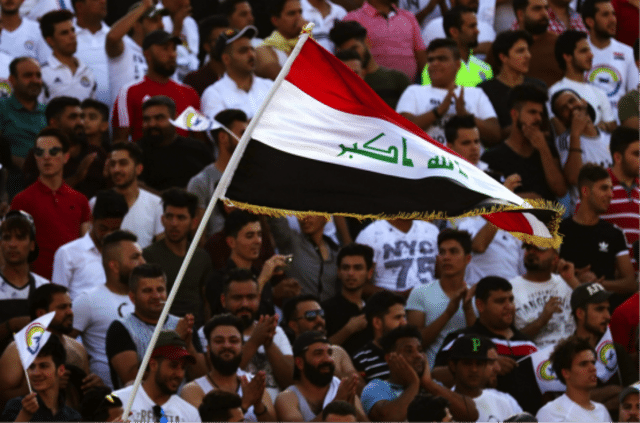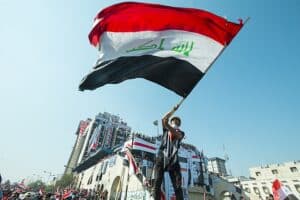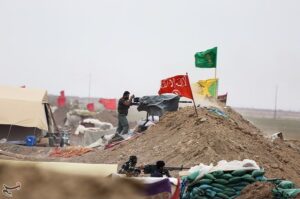Photo: Wikimedia Commons
On 18 December governorate elections will be held in Iraq. Iraq consists of 19 governorates, also known as provinces, of which 15 will participate – the Kurdistan region holding elections on its own accord later. The last provincial elections were held in 2013. The upcoming elections were scheduled to take place on 20 April 2020 but were delayed amid the 2019 demonstrations. It was decided to postpone setting a date for the elections until after the parliamentary elections that were held in October 2021. Last March, the provincial elections were set to be held on 18 December 2023.
Context
These are the first elections held after the October 2021 parliamentary elections. These elections were bound to put an end to the corrupt and kleptocratic political system of Iraq, which was demanded during the 2019 October Revolution (Tishreen Movement). It took a year to form a new government, which in the end consisted of the same elite parties that have ruled the country post-2003, with no systemic change made. The political regime is still controlled by the forces that were installed in 2003. The momentum in 2021 to make political reforms failed and the status quo prevailed. Now is the first occasion after these elections and a new chance for the population to demand political change, be it on the regional level this time. New members for provincial councils will choose governors, which will establish local governments.
With the last provincial elections being held more than ten years ago, local councils are completely out of touch with national politics. New parties have emerged and national movements and protests haven’t effected the local composition of politics. The already chaotic political landscape in Iraq makes these elections difficult to interpret but at the same time the results will be symbolic for the state of politics.
Provincial power
The provincial councils have fallen victim to the political elite from the start in 2008 when provincial governments were created. Iraqi people see the provincial level just as another playing field of the elite parties that only adds another layer of bureaucracy which in turn leads to even more corruption. When initiated, the idea was to decentralise politics in order to represent people better. If executed properly, provincial politics have strong executive and financial powers, as they are not officially under the jurisdiction of national ministries and can set their own budgets.
Challenges
In the first place, a low voter turnout is expected, questioning the elections’ legitimacy. Of the more than 23 million eligible voters only 60% received the mandatory biometric cards in order to vote. Around 25% of eligible voters is expected to really cast their ballot. Especially young people have a very low level of trust and do not think elections make an impact. There are also concerns about whether elections will be free and fair. Ethno-sectarian tensions historically influence the results – in areas with a wide variety of ethnic and religious groups, campaigns are never about political content and ideologies but pure ethnic-based, often “harmful sectarian rhetoric”. Some parties have armed wings, making competition between parties unfair and amplifying ethnic tensions. The Iraqi political landscape is chaotic and scattered. Around 6,000 will candidate themselves, running from 134 electoral lists, consisting of 39 coalitions and 29 parties, besides many running independently.
Predictions
Perhaps the most important condition that will question the legitimacy is that the Sunni Sadrist movement will boycott the elections. Millions of people who have supported this political force based around Muqtada al-Sadr in recent years will not be represented. The other big Sunni party, Taqadum, has been going through tough weather lately. Speaker of the Parliament al-Halbusi (Taqadum) was dismissed last November. The party will have to retain the speaker position in order to not show weakness and loose voters to other Sunni parties.
The ruling parties on the national level, known under the name of Coordination Framework, participate on the provincial level in many possible combinations in order to receive as much votes as possible. Depending on the province, individual parties of the CF work together or are each other’s opponent. Where they expect to become the biggest alliance – the CF’s home areas of Baghdad and southern provinces –, they compete to get the largest possible say in the CF alliance that will follow. In the provinces with severe competition from other alliances, they cooperate in order to not be diminished by the enemy parties.
Only if the opposition parties are able to form a united front, will there be the possibility to coerce political change. In the field of non-establishment parties, there has been struggles to form a coherent opposition. One alliance consisting of ten parties, Qiyan al-Madani (Civil Values), is the main opposition voice which hopes to make a change on the regional level. The potential that 2021 posed was not redeemed. The opposition forces at that time proved unable to make a stance and newly elected in some cases behaved just like the ‘old politics’ of patronage systems. Two years have passed and they have had time to grow in capacity. If there is no significant success now, the momentum of the anti-establishment movement might fade away and traditional forces will prevail for the time to come.
Implications
The elections in the northern Kirkuk and Nineveh province are interesting to follow, as the result will have implications for the internal relation in Iraq between Baghdad and the Kurdish Regional Government (KRG). Kurdish parties running in these provinces believe them to be part of Kurdistan. If Kurdish parties are able to receive the majority of votes, which is a serious possibility, further integration of the provinces into the KRG is expected, deteriorating the KRG-Baghdad relations.
Next elections
National elections will most likely take place in 2025 (an official date has yet to be set). The outcome of next week will shed light on the potential of the anti-establishment movement during the parliamentary elections in two years. The success of these provincial elections is seen as crucial for the credibility of the current political system in Iraq. “Continuing the status quo will mean that Iraqis’ belief in change through elections or new political movements will be further eroded.”



